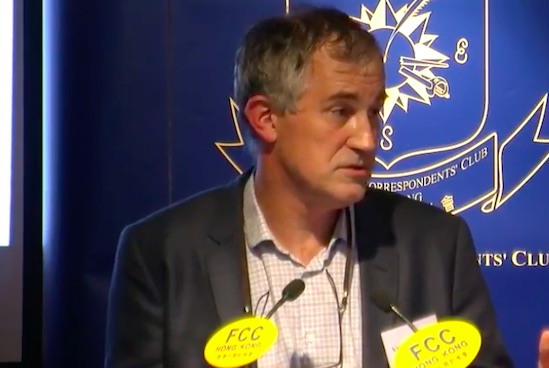Hong Kong has refused to renew the visa for a British journalist after he chaired a controversial talk by an independence activist in August.
The move, first reported by Hong Kong Free Press, comes amid fears over deteriorating media freedom in the city, with some describing it as “a tactic borrowed straight from Beijing.”
A spokesperson for the Financial Times confirmed today that the authorities have rejected an application by their Asia news editor Victor Mallet to renew his work visa.
Mallet is also the vice president of the Foreign Correspondents’ Club (FCC), a position he has held since 2017.
The FT spokesperson told HKFP: “This is the first time we have encountered this situation in Hong Kong, and we have not been given a reason for the rejection.”
But according to a report by HK01, “people close to the matter”, say Mallet’s visa was rejected because the FCC decided to go ahead with the talk by Hong Kong National Party (HKNP) leader Andy Chan.
Financial Times confirms Victor Mallet’s visa not renewed by Hong Kong (as reported by @HongKongFP) FT statement: pic.twitter.com/NTG6oTjGwd
— Austin Ramzy (@austinramzy) October 5, 2018
Chan was invited to speak at the FCC on August 14 after the police proposed to ban his small party on national security grounds in July (the ban was eventually made official last week).
To the chagrin of officials in Hong Kong and China, the talk went ahead, with Chan calling independence the “only way to achieve democracy” and comparing China to “colonizers” who were destroying Hong Kong.
In the wake of the talk, Mallet and the FCC found themselves in the crosshairs of several pro-Beijing figures including former chief executive Leung Chun-ying.
Via his Facebook page, Leung launched a series of attacks at the FCC including calling into question their lease of their government-owned headquarters and comparing the club’s invitation of Chan as akin to allowing criminals or terrorists to speak.
Mallet and the FCC responded by saying: “We stand for freedom of the press, we stand for freedom of information.”
https://twitter.com/rthk_enews/status/1048136350908612608
Following news of the visa refusal, industry figures expressed concern over the precedent that today’s announcement sets for the large number of foreign journalists who work in Hong Kong.
The Hong Kong Journalists’ Association (HKJA) posted on Facebook that they were “shocked and angry” with the decision not to renew Mallet’s work visa, and urged the government to reconsider that decision or explain the reasons why the visa renewal was refused.
“HKJA believes that freedom of speech and a free press are the cornerstones of Hong Kong’s success. Refusing to issue visas will further harm press freedom and freedom of speech, and seriously affect Hong Kong’s status as an international city.”
https://www.facebook.com/HKJA.official/posts/10156532489715309?__xts__[0]=68.ARDxhj4zsoGpXZeXkBcfMVkHboLYWXXWaBfyx0FGI_wxYf6kroIBer2o3HwFwgWHLUGOvaYW8a0NwX-Iwb7Toey8Q9eNPlkN27RqHtmtUjoLWCzIpc_YSi4AuPPtKi8itur1xtCy9fyb3f_uGn9BIclFQrzNL_TZgn3i2wwDnOCfrN5thsXlWwY&__tn__=-R
Human Rights Watch’s China researcher Maya Wang tweeted the move was: “Shocking, unprecedented, and a tactic borrowed straight from Beijing.”
Joanna Chiu, the deputy bureau chief of Star Vancouver and former China correspondent tweeted: “Beijing has blocked visa renewals for multiple correspondents but this has never happened in Hong Kong to a foreign journalist residing in the city.”
Melissa Chan, a former Al Jazzera China correspondent, tweeted that this incident is “a much bigger deal than any correspondent getting kicked out of China.”
Chan — whose press credentials were not renewed following a series of sensitive reports for the network — tweeted: “I say this as a reporter who was kicked out of China. Getting kicked out of Hong Kong is a much bigger deal. We expect Beijing to attack the media. The world was promised a different system, one with rule of law, for Hong Kong.”
Reporters Without Borders (RSF) also urged authorities to reverse the decision.
“This is clearly a form of retaliation for his involvement in the public talk organized in August by FCCHK, which angered Beijing by featuring a pro-Hong Kong independence activist,” said Cédric Alviani, Director of the RSF East Asia Bureau.
“Such action is yet another proof that the Chinese authorities are extending their policy of intimidating foreign journalists to the territory of Hong Kong.”





Reader Interactions